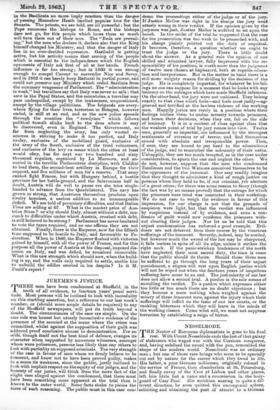J URYMEN'S JUSTICE.
THREE men have been condemned at Sheffield, in the teeth of all evidence, to fourteen years' penal servi- tude. Most persons will be inclined to look with incredulity on this startling assertion, but a reference to our last week's number, or (should more ample details be requireci) to any of the Sheffield newspapers, will put its truth beyond a -doubt. The circumstances of the case are simple. On the -one side was honest but utterly inconclusive evidence of the presence of the accused at the scene where the crime was committed, whilst against the supposition of their guilt was adduced proof conclusive almost to demonstration. For an .alibi, though itself not the best kind of defence, changes its character when supported by numerous witnesses, amongst whom were policemen, persons less likely than any others to look with partiality on supposed criminals. The very strength of the case in favour of men whom we firmly believe to be innocent, and know not to have been proved guilty, makes in a sense its weakness, since the public, justly inclined to look with implicit respect on the equity of our judges, and the honesty of our juries, will think from the mere fact of the slight case alleged against the condemned, that there must have been something more apparent at the trial than is known to the outer world. Some facts shake to pieces the iorce of such reasoning. The public must in this case con- demn the proceedings either of the judge or of the jury. If Justice Mellor was right in his charge the jury went utterly wrong in their verdict. If the opinion given by the jurymen was just, Justice Mellor is unfitted to sit upon the bench. In the midst of the trial he suggested that the case for the prosecution was too weak to be proceeded with, and his charge plainly pointed out the duty of acquittal. It becomes, therefore, a question whether we ought to trust the judge or the jury. There is little doubt about the answer. As a general rule the opinion of one skilled and educated lawyer, fully impressed with the re- sponsibility of his position, is worth more than the judgment of twelve men chosen at haphazard, both a regards educa- tion and inexperience. But in the matter in band there is a still more weighty reason for abiding by the decision of the judge. He is completely impartial, for whatever be his fail- ings no one can suppose for a moment that he looks with any leniency on the outrages which have made Sheffield infamous. On the other hand, the jury were not unbiased. They belong exactly to that class which feels—and feels most justly—ag- grieved and terrified at the lawless violence of the working men. Happily juries are rarely in a position where their feelings incline them to undue severity towards prisoners, and hence their decisions, when they err, fail on the side of leniency. It is in a contest of class against class that the weakest point of trial by jury comes into view. Twelve men, generally so impartial, are influenced by the strongest sentiments of aversion or of terror, and find themselves armed with absolute and irresponsible power. Then, if ever, they are bound to pay heed to the admonitions of the judge, and to remember the solemnity of their oaths. Unhappily, they are too much tempted, as in the case under consideration, to spurn the one and neglect the other. We do not, however, suppose that the men who condemned Tomlinson and the two Watsons conceived themselves to be the oppressors of the innocent. One may readily imagine that they thought to administer a kind of rough justice on persons whom they held to be, if not criminal, yet abettors of a great crime; for there was some reason to fancy (though the fact was by no means proved) that the outrage for which the prisoners were tried was concocted in their workshop. We do not care to weigh the evidence in favour of this impression, for our charge is not that the grounds of suspicion were light, but that the verdict was influenced by suspicions instead of by evidence, and even a con- fession of guilt would now condemn the prisoners with- out clearing their judges. Nor let us be told that this unjust condemnation has enforced a good example. Evil- doers are not deterred from their course by the vicarious sufferings of the innocent. Severity, indeed, may be needed, but however much the sword of the law may be sharpened, it falls useless in spite of all its edge, unless it strikes the right neck. If the panic-stricken tradesmen of the north have neglected their most sacred duty, the time is come that the public should do theirs. Should these three men be suffered to go through the long years of their unjust punishment, a stigma will rest upon English justice which will not be wiped out when the fourteen years of iniquitous suffering have come to an end. The just celerity of our law does not allow a second trial. A pardon is the sole means of annulling the verdict. To a pardon which expresses either too little or too much there are no doubt objections ; but they become a were nothing when weighed against the misery of three innocent men, against the injury which their sufferings will inflict on the fame of our law courts, or the rankling bitterness which they will leave in the minds of the working classes. Come what will, we must not suppress terrorism by establishing a reign of terror.






























 Previous page
Previous page